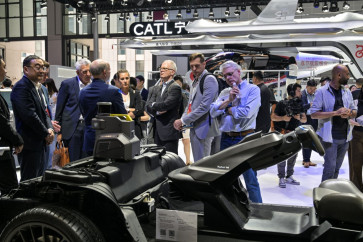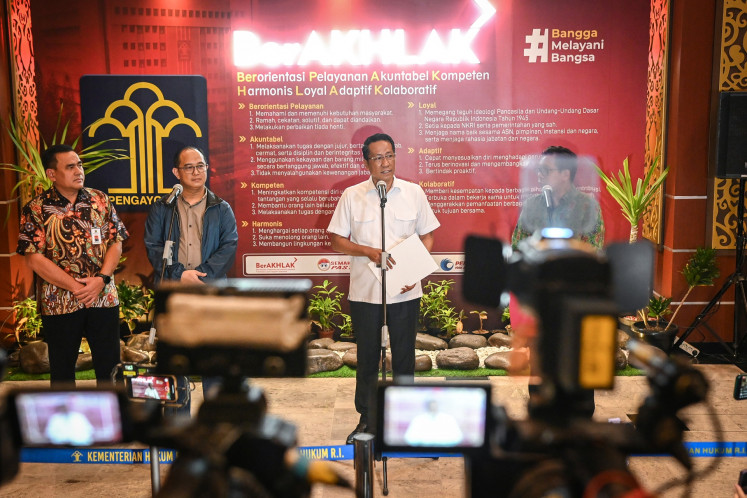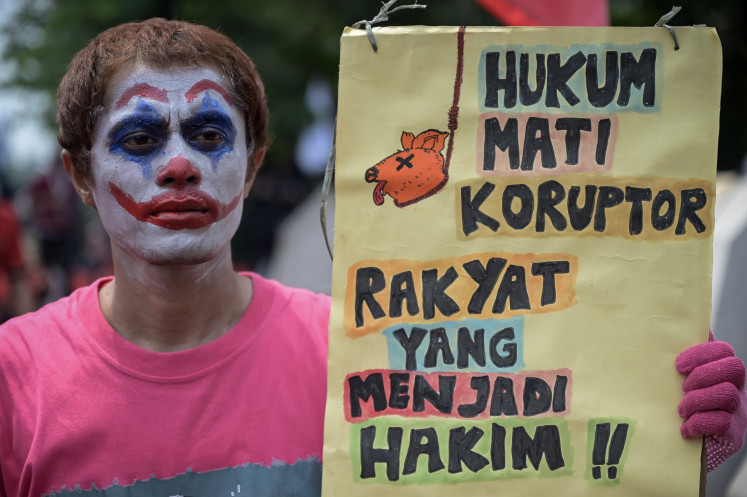Popular Reads
Top Results
Can't find what you're looking for?
View all search resultsPopular Reads
Top Results
Can't find what you're looking for?
View all search resultsAustralia, RI hold inaugural defense talks
Defense ministers from Australia and Indonesia are slated to engage in a two-day meeting starting Tuesday
Change text size
Gift Premium Articles
to Anyone
D
efense ministers from Australia and Indonesia are slated to engage in a two-day meeting starting Tuesday.
There will be three main topics to be discussed during the meeting, Indonesian Defense Ministry secretary-general Vice Marshal Eris Herryanto said Monday.
“The topics are defense cooperation, maritime security and safety and defense industry cooperation,” he told The Jakarta Post over the phone.
“On defense cooperation, we have met several times [in military exercises] so we are going to work out an implementing agreement.”
As the meeting would be the first for both countries, Eris said there would be exchange of views on what could be done.
Australian Defense Minister Stephen Smith is scheduled to hold the inaugural Indonesia-Australia Defense Ministers’ Meeting with his host Indonesian Defense Minister Purnomo Yusgiantoro, the Australian Embassy in Jakarta said in a media release on Monday.
Both defense ministers are also expected to sign the Indonesia-Australia Defense Cooperation Agreement, which will formalize and strengthen the bilateral defense relationship and provide a framework for future engagement initiatives.
On Wednesday, Smith and Australian Defense Materiel Minister Jason Clare will attend a defense industry symposium to discuss opportunities for greater cooperation between defense industries.
Eris said the talks on Wednesday would only be initial ones to feel out the defense industry capabilities of each country, while maritime security and safety would be handled by the transportation ministries.
Australian Infrastructure and Transportation Minister Anthony Albanese is part of the entourage.
Eris refused to comment on speculation that Australian warships would be allowed to enter Indonesian waters to intercept boat people seeking refuge Down Under.
“It is better to wait for the final results tomorrow [Tuesday] to get a clearer picture,” he said.
Talks on cooperation in the maritime sector between Indonesia and Australia have been under way since July 2, when President Susilo Bambang Yudhoyono met with Australian Prime Minister Julia Gillard in Darwin, Australia.
Australia plans to deter future arrivals by deporting boat people to the small island nation of Nauru or Papua New Guinea.
The July meeting also resulted in the grant of four C-130H Hercules heavy transport airplanes and the sale of another six airplanes to the Indonesian Air Force in what many speculate was a quid pro quo arrangement to allow Australian vessels to intercept the boat people.
Indonesian Transportation Ministry spokesman Bambang Supriyadi Ervan said that maritime cooperation would focus on search and rescue efforts.
“We have also been collaborating with Australia in the past three to four years on the Indonesian Transport Safety Assistance Package,” he said, such as mapping flight paths to help pilots navigate treacherous mountainous areas in Papua.
Contacted separately, Iis Gindarsah, a defense analyst from the Centre for Strategic and International Studies (CSIS), said the Indonesian government should be transparent in arranging permission for
Australian vessels to enter Indonesian waters.
“Should we allow the Australian vessels to intercept the boats, we can allocate our patrol boats to other areas,” he told the Post over the phone.
“However, there must be a clear code-of-conduct for Australian vessels to do so.”
Weapons, for example, had to be pointed down, and the vessels should not be carrying out naval surveillance activities, he added.
“With clear and transparent arrangements, we can build better bilateral relations,” he said.
diplomacy










